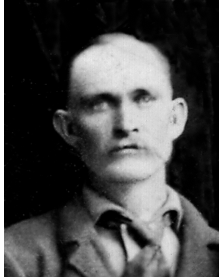 |
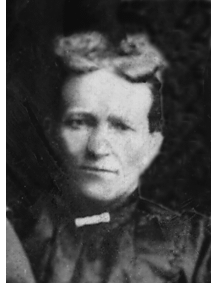 |
GEORGE WASHINGTON GIFFORD
AND
LOUISA HALE GIFFORD
By Martha Gifford Huntsman, a Daughter.
 |
 |
The story of my father and mother as I remember them and the things they told me.
My father is George Washington Gifford. He was born in Manti, Utah on the 10th of January 1857. I heard him tell many times that he used to herd cattle or sheep or both, on the hill where the beautiful L.D.S. Manti Temple now stands. He was the son of Henry Dill Gifford and Almira Ann Braffett Gifford. My mothers name is Louisa Hale Gifford. She was born in Salt Lake City, Utah on the 9th of December 1856. She was the daughter of James Hale and Lucy Clements Hale.
My parents were wonderful parents. They did all they could for us children. My father and mother met at a dance in Springville, Utah.
My father and his brother loved to dance so they went to the different little towns to dance. One night, when they went to Springville to a dance they met these two lovely girls. One was to become my mother and the other was her half-sister. The boys asked them for a dance and date. These girls were from Hooper, Utah and was visiting some relatives in Springville at the time. Both of these friendships ripened into love, then courtship, and finally marriage. As the story goes, my mother Louisa wrote to her mother in Hooper and told her of this fine, tall, good looking fellow she had met and he wanted her to marry him. My grandmother Hale wrote to her and told her to invite this young man to go to Hooper and meet her family. This she did and grandmother approved of him. They were married in Hooper, Utah January 19th, 1879.
My father took her to Marysville, Utah and set up house keeping there. Their home was humble, but mother was industrious and creative and she made their home one of love and comfort. Their home was big enough to raise a garden and they raised a few animals. Father worked for other people for awhile after their marriage. It was here in Marysville that their first child was born, Lucy Ann, December 20th, 1879. My parents said she was quite a smart girl for her age and helped them do things most girls her age couldn't do.
My parents moved several times to different towns but finally settled in Hooper, Utah. It was here that my sister Lucy Ann met with a very tragic death. My mother and father told us of her death. One day mother and father were both gone somewhere and when Lucy came home from school the house was cold and my parents think she tried to start a fire in the wood stove. She had a dress on with big ruffles on the bottom of the sleeves they caught on fire and she ran from the house into the door yard. When my parents got home they found this beautiful daughter dead from the burns. It was a terrible shock for my dear parents, I'm sure. It took them quit awhile to get over this tragic death.
My oldest brother George Alvin was born in Joseph City, Utah November 24th, 1881 and on January 6th, 1884 in Hooper, Utah my second brother was born, Henry Elmer. He was the first child to be born in Hooper, Utah. My sister Effie Louisa was born July 23rd, 1885 in Hooper but she only lived a few months and was buried next to my sister, Lucy Ann. My sister Helena was born in Hooper on August 7th, 1887. My brother James Alma was born in Hooper too on September 10th, 1889. As I remember, I was told that Father and mother had moved to Woodville, Idaho before James Alma was born and mother went back to Hooper to have James Alma as her mother, Lucy Hale had delivered all the rest of the family , who was born before James. My mother never had a Doctor when her children were born, just her mother, Grandmother Hale. I can't quite remember, but I think Grandmother Hale came up to Idaho and delivered we other four children. My Grandfather Hale had two wives. He and his other wife moved to Arizona, but my Grandmother chose to stay in Hooper. My father was real good to watch over her.
In 1888, my father had heard of the nice fertile soil and the great land in the Snake River Valley in Idaho so they decided to move to Idaho. So they put a few things in their covered wagon and headed North. I don't know how long it took them to reach the place where they had started for but I'm sure it took them a week or two. When they got to Shelley, Idaho they came to the Snake River. My father met an old friend by the name of Mitchell and he wanted dad to settle there. My father said he looked across the river, it looked better over there, so he decided to go on. The river was too dangerous to cross by wagon, the closest bridge being at Eagle Rock, now Idaho Falls, Idaho and at Blackfoot, Idaho, so dad decided to go back to Blackfoot and cross the river there so he could better explore the land on the West side of the river. There he found vast masses of lava rock covered with rich cedar trees. As he traveled along, he found as to what he thought to be real fertile ground. He finally came to a place North of the river which looked like a good place to settle on. To their surprise, they found a few had already settled there and they were old friends of mother and dad's who were from Utah, too. They had settled near the river. The friends were William and Heber Mathews, brothers and Jasper and William Hammer, brothers and George Munsey. My father said they had saved the place for someone else, but they let my father have it. He filed for a Homestead on it. My father and mother were the sixth who had settled there. There were one hundred and sixty acres in the place dad filed on and it was real good farm land. They could grow all kinds of crops such as hay, grain of all kinds, potatoes, corn and peas. The farm my father settled on was a little North of where his friends had settled.
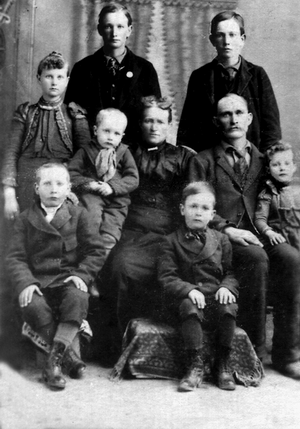 |
| Bottom Row L to R: Alma James Gifford, Lester Gifford |
| Middle Row: Moses Gifford, Louisa Hale Gifford, George Washington Gifford, Martha Elnora Gifford |
| Top Row: Helena Gifford, Alvin Gifford, Henry Elmer Gifford |
| Soon to be born: Milo Gifford |
Right back of the farm there was a large lava bed covered with good cedar trees. These cedar trees were real good wood to burn. Father and the rest of the men would take their teams and wagons and go out on the lava beds to get loads of wood. It was what they burned in their stoves. It was the only kind of fuel they had but it was real good. Besides hauling this wood for their stoves, they would get wood and take it to Eagle Rock, now Idaho Falls, to sell it to
buy flour and groceries and other things. There has been thousands of loads of wood taken out of those lava beds. I don't know how those early settlers could have lived if it hadn't been for the wood they sold. It was real dangerous to have the horses on that rocky beds, but they had to do it. My father and his friends built a small one room cabin on father's and mother's farm.
The first child to be born in Woodville was my brother Lester. He was born on the 28th day of August, 1891. Then, on November 5th, 1893 another little girl was born, it was me and they named me Martha Elnora. I must have been a welcome little girl, as they hadn't had a little girl for six years. Then on September 27th, 1893 another little boy was born. He was named Moses, then in October 20th, 1899 another little boy was born. The named him Milo, and is the youngest of mothers and fathers 10 children.
Well do I remember that one room cabin, our home. It was quite a large room. It was made of adobe. It was made of mud and I can't remember what else they used to hold the mud together. I remember there was only one bedstead in the room. Father and mother slept in it and we children slept on the floor on straw ticks. The cover was made of strong material, the shape of a mattress. Then it was filled with straw from the grain. The straw tick was put on the one bed in the daytime, then on the floor at night for us children to sleep on.
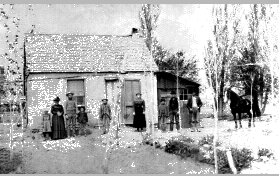 |
| First Gifford
Home 1890 Martha Elnora Gifford, Loisa Hale Gifford, George Washington Gifford, Mose Gifford, James Alma Gifford, Helena Gifford, Lester Gifford, George Alvin Gifford, Henry Elmer Gifford, and Milo Gifford on the horse. |
One thing about living on a farm, we had lots of all kinds of vegetables and father had planted some apple trees, raspberries and currants so we had some fruit, too. Dad would kill a beef or park when we needed meat and mother done a lot of canning, so we didn't go without plenty to eat. Even if we were poor and didn't have some of the things we have now, we were a happy family. As I look back now, I had a happy childhood until my mother passed away on the 12th of May, 1904. My parents were wonderful parents and was kind to us and did all they could for us. My father was a good honest fine man. He didn't smoke or drink liquor and didn't use bad language. He wasn't a member of the Church, but was really a fine honest man. He had been a member of the Church, but when he was about seventeen, some of the older men talked my father into leaving the Church. I am sure he knew the Church was true, but he never joined the Church again, but always saw that we got to Church. Mother was a real religious woman and lived the Gospel the best she could. I remember when she went to pay her tithing, she took me with her sometime. At that time they paid their tithing with butter, eggs and other things they had. I have always remembered her paying her tithing and have tried all my life to pay mine. I remember when I was a little girl, some of mother's family in Utah would send her some dried berries. They called them Bullberries. Mother would make boiled pudding out of them and they were real good.
The land on our farm was real good soil and father was a hard worker and the older boys helped him on the farm. We raised good crops and soon had better things and father built more rooms which
we really needed. When I was six, father built another room on the west of our cabin. It was called the lean-to, as the roof slanted down from the roof of the building toward the ground. The ceiling was lower on one side than the other. I remember when father and the boys was putting on the roof, mother took me out under it and combed my hair. I would keep looking up to watch and mother would hit me on the head with the comb, so she could comb my hair. The room was as long as the old one, but not as wide. When it was finished, there was room to put a bed on each end. We had a pot belly stove in between for heat. Mother would sit by the stove and sew rags for carpets. I thought I was big enough to sew too, so mother bought me a little thimble, so I could sit by her and try to sew. I'm sure I didn't do very good, but she made me think I did. When I was a little older, father built another lean-to on the north side of the house. It was used for the kitchen. We had to go out doors to go to that room, but we were sure happy to have more room to live in. Life went on about the same for a few years. As I think back, we were a happy family and we had such a wonderful father and mother. When I think of my childhood, I feel it was a happy one, but it didn't last only a few more years.
In the spring of 1904, in May, my mother got real sick and she continued to get worse. The doctor had father take her to the hospital in Idaho Falls. Well do I remember the day father backed the white top buggy up to the front door of our home. They made a bed for mother in the back of the buggy and took mother out and put her in it and took her to the hospital. It was a sad day for us all. I was ten years old at the time and was a mommie's girl. I remember that I had knelt by her bed for hours at a time before they took her to the hospital. They starved her for twelve days before they operated. I remember the family took me to the hospital to see her once. The hospital was sure an awful looking place. Mother would say," Nora please give me a swallow of water and a crust of bread". Believe me it was a hard thing to take and I will never forget her asking for bread and water. The doctor decided it was appendicitis, but didn't know that she an abscess on her appendices. They didn't have the fine doctors they have now. They operated on her and when they cut into the abscess the puss soon spread through her body and she passed away May 12th, 1904. They said the doctor was drinking when he operated on her. Some how I knew the doctor and when I saw him on the street, I had an awful bad feeling towards him. I was just a small girl. Well do I remember when father came home to tell the family she was gone. He got Moses, Milo and I to go to him, he put his arms around all three of us and with tears in his eyes he said " your mother is gone". Then he said " I will have to be mother and father to you". This he surely tried to do. He was very good to us and took good care of us. They didn't have a funeral home at that time and when anyone passed away they were taken to their home until the funeral.
When I was twelve my only sister Helena got married and moved quite away from Woodville. I decided it was my duty to take over the house work and cooking for my father and four brothers. That is what I did and I am sure I didn't do a very good job, but I sure tried to do the best I could. I had to wash clothes on the washboard. I remember making big batches of bread. I don't know how good it was, but I know it didn't last very long. My father and brothers was good to me and helped what they could, but we had a large farm and it kept them quite busy on it. We were still living in the adobe house father had built and the two lean-to rooms, so we had more room. Father and the boys hauled wood from the lava beds west of our home to keep us warm. It was cedar wood and it was real good to burn. I never remember of being cold or hungry. Life went on about the same for a few years. I sure watched over my two little brothers.
Lester was married to Fanny Elsada Hope, 22nd April, 1909. I was married June 3rd, 1910 to Evon Wesley Huntsman. James was married to Sarah Anna Mason, 7th of August, 1911. It was real hard for me to leave my father and brothers to take care of themselves, but I lived just a little way from them and would go over every few days and clean up the house and do some baking for them. Also, I did their washing and ironing for some time.
My husband went on a mission to the Tongan Islands in March of 1912. He was gone three years and came home in March, 1915. Awhile before Dad (Mother always called him Dad) came home from his mission I had gone to live with my Father. He was still living in the adobe home. Dad farmed with my father the first year He was home. My brother Alvin bought my father"s farm about 1916, as I remember it. I can't remember when the adobe house was torn down, but it must have been around 1917. As I remember, Alvin built a two story house just back of the adobe house.
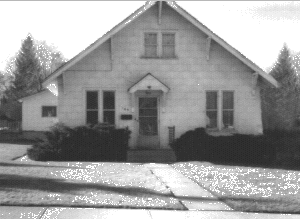 |
| White Gifford Home built around 1916 |
Alvin couldn't keep up the payments on the farm, so he turned it back to father. Then father sold forty acres to my husband and I and sold another to my brother James and Alvin kept the lower twenty acres for awhile. When we bought the forty acres from my father we were living on a small farm a mile north of my fathers farm. It was poor soil and we didn't make much on it. My father had come to live with us when we moved up on that farm. When we bought the forty acres from my father we moved down on it in a four room house. My father lived with us in that house, too, most of the time. There were eight of us including my father. We were quite crowded, but was happy to take care of father. My brother Jim became discourage, trying to pay for his forty acres. He gave up the forty acres and moved to Jerome, Idaho. Father then sold us that forty acres. We then moved in the white house Alvin built. We were sure happy to have more room for our family. There were two bedrooms down on the main floor and two in the upstairs. There were also a kitchen, dining room and a front room. We were real comfortable.
My father continued to live there with us and we were happy to have him there. He would go visit some of the other children for awhile, but our home was his home, too. I remember my brother Moses had moved out to Washington State for awhile, and two winters father went out to stay with Moses and May but came back in the summers. Sometimes he would go to Utah and visit some of his relatives, but for the most of the eighteen years he lived with us. I have always been grateful that I could take care of him. Dad and the children was all real good to him. He was a very kind man and the children didn't seem to make him nervous. Sometime I would say to the children when they were noisy," You be quite, you are making grandpa nervous", and father would say," they are not bothering me", so I guess it was me getting nervous.
My father was a widower for forty three years. When anyone said any thing about him getting married again he would say," when my wife died my love went with her". I never knew of father being interested in another woman.
I think it was the second winter that father went out to spend the winter with Moses and May that he got pneumonia and was real sick. Moses called the family and told us about father being sick. Six of us, Dad and I, Alvin and Florence, my sister Helena and Lester went out to Washington. By the time we got out there father was much better , so we stayed a few days, then came home. It wasn't long until father was well enough to come back home to Woodville. Father always seemed to be quite strong and healthy. He was six feet tall, and a well-built man. He used to take long walks almost every day that the weather would permit. I think that is why he was so healthy. He would walk down to the bottom of the farm, which was about a mile away and then back to the house. One day, when he went down in the field, we had a bull down there, and it attacked father. It was a wonder he wasn't killed. It knocked him down. Father said he had a pitchfork in his hand and that he kept sticking the bull with the fork, and finally the bull went away and left him. I am sure the Lord was with him.
In father's later years, his health failed him some. He could still walk and get around real good for his age. He would seem to be feeling alright and then pass out. If he was sitting on a chair he would stiffen out and fall off the chair. He wouldn't be in the spell very long and seemed to feel alright. It was sure a weary to we as a family. If I went to a dance or a party or something I would never go to bed until I went to father's bed to see if he was alright. About two or three years before he died, his mind got quite bad and we really had to watch him. We never left him alone for fear that he would do something to himself. He was living with dad, I and family. A few months before he died, my brother took him to Rigby, Idaho where my sister Helena lived. I had watched over him day and night and was quite tired. He wasn't up there long until my sister called and said father was quite sick, so dad and I went up to get him and took him to the hospital. The doctor said he had pneumonia and was very sick. I sat up with him two days and nights. He kept calling my name. I never heard him say any of the family's name. I guess he called me, as he had lived with us for so long and I was the youngest girl. We had bought the farm from him that he lived on since 1888. I know I wasn't any better to him than the rest of the family. We all loved him very much, as did all the grandchildren. On the third night he was in the hospital my brother, Alvin and Florence came to stay with him so I could go home to rest. I was so worried that I didn't rest much. I got up early the next morning and was getting ready to go back to the hospital, when the phone rang and Alvin said father was real bad. Dad took me right up to the hospital. I wasn't there very long before he died, but I was there long enough that he knew I was there and he called my name. I gave him a drink of water and was holding his hand when he passed away. How grateful I am that I was there that long. Father passed away 23rd of November, 1942. He would have been eighty six the tenth of January, 1943. His body was brought to our home in Woodville until the funeral service. He was buried in the Woodville Cemetery by the side of my mother. I was sure lonely for awhile after he passed away. I will always be grateful for my wonderful father and mother for their love and good example they set for us.
Taken as written, from a handwritten history Martha Elnora Gifford Huntsman wrote about her memories of her mother and dad.